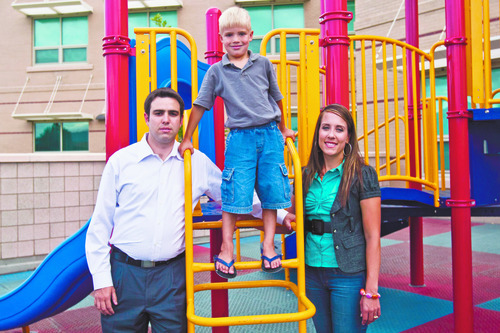This is an archived article that was published on sltrib.com in 2012, and information in the article may be outdated. It is provided only for personal research purposes and may not be reprinted.
Families left in the lurch when the Murray School District abruptly canceled its Portuguese dual immersion program this month may get another chance to enroll their students for the 2013-14 school year.
The Utah State Office of Education has vowed to try to find a way to offer the program to some of the 50 first-graders who signed up for it at Parkside Elementary School in Murray this year, but were shut out when the district didn't hire a qualified Portuguese teacher in time. School starts Aug. 24.
Gregg Roberts, world-language specialist and dual language-immersion specialist at the Utah State Office of Education, has told some disappointed families that a Portuguese dual immersion program for second-graders is being developed, said parent Wagner Oliveira. He was among the parents who protested when Murray axed its program two weeks before the start of school.
Three districts have shown interest in hosting such a program, but the details are still being worked out, said Oliveira. He said interested parents have been told they will receive more information later this fall.
Several upset families are now relieved that their students may still get a chance to learn Portuguese.
"I feel really great. It's a great opportunity for the kids who are interested," said Oliveira.
Murray Superintendent Steven Hirase apologized to parents about the cancellation in a statement released earlier this month. He said it was difficult to find a teacher who had Portuguese language fluency in addition to elementary education training.
In a letter to parents, Hirase said the district ran into trouble with the visa process required to bring their top candidate to the U.S. But some parents, who have voiced their frustration on a Facebook page called "Stop Murray School District from Cancelling the Portuguese Dual Immersion," wonder why the district didn't work harder to find a replacement.
Students are taught entirely in the new language they are learning for half the day. The second half is spent learning in English. The program starts when students are in first grade and curriculum builds in subsequent school years. So students who don't start the program in first grade miss the opportunity to enroll.
Upon learning of the cancellation, Oliveira sent an e-mail to school officials, saying had he known the Portuguese program would be canceled, he might have tried to get his son into a Spanish or French dual immersion program. He had planned to drive his first-grader to Murray each day from West Valley City, but now his son will start in a traditional class at Granger Elementary School.
Oliveira said while he's still frustrated with Murray's handling of the situation, he's encouraged there is still a chance for his son.
"I'm satisfied with the resolution," Oliveira said Wednesday.
Twitter: @mrogers_trib —
Utah's growing interest in dual immersion programs
Utah parents are increasingly enrolling their children in dual immersion programs offered at 78 elementary schools statewide. This year, approximately 14,000 children will start school in dual immersion programs in Utah, taught in Spanish, French and Chinese. Portuguese will be offered for the first time this year in elementary schools in the Alpine and Provo school districts.
Generally, demand for the programs is greater than the number of open slots, said Gregg Roberts, world-language specialist and dual language-immersion specialist at the Utah State Office of Education.
To help add Portuguese programs, the state received grants from the Department of Defense, which has identified it as a language needed to communicate in Brazil and many African countries.
Utah is home to about 30,000 people fluent in Portuguese, Roberts said, including 15,000 people from Brazil and another 15,000 people who learned the language while serving missions for The Church of Jesus Christ of Latter-day Saints.
With Brazil one of the top LDS missionary destinations, the community is interested in children learning Portuguese, Roberts said



